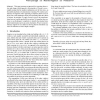Free Online Productivity Tools
i2Speak
i2Symbol
i2OCR
iTex2Img
iWeb2Print
iWeb2Shot
i2Type
iPdf2Split
iPdf2Merge
i2Bopomofo
i2Arabic
i2Style
i2Image
i2PDF
iLatex2Rtf
Sci2ools
103
click to vote
ECAI
2004
Springer
2004
Springer
Simplicity in Solving the Frame Problem
Abstract. This paper presents an approach for reasoning about action and change which appeals to the principle of Occam’s razor— roughly stating that the simplest explanations are the best ones—as the underlying theme of commonsense reasoning. We conduct a preliminary investigation of how appealing to simplicity allows us to address some of the challenges faced when reasoning about the effects of actions. In particular, we apply Occam’s razor to the transformations between worlds specified by an action. To formalise these notions we use Kolmogorov complexity to identify the intended (simplest) transformation given an action description. We give some preliminary support for our claims by showing that the formalism captures our intuitions on some simple examples.
Artificial Intelligence | Commonsense Reasoning | ECAI 2004 | Preliminary Investigation | Simplest Explanations |
Related Content
| Added | 01 Jul 2010 |
| Updated | 01 Jul 2010 |
| Type | Conference |
| Year | 2004 |
| Where | ECAI |
| Authors | Victor Jauregui, Maurice Pagnucco, Norman Y. Foo |
Comments (0)

